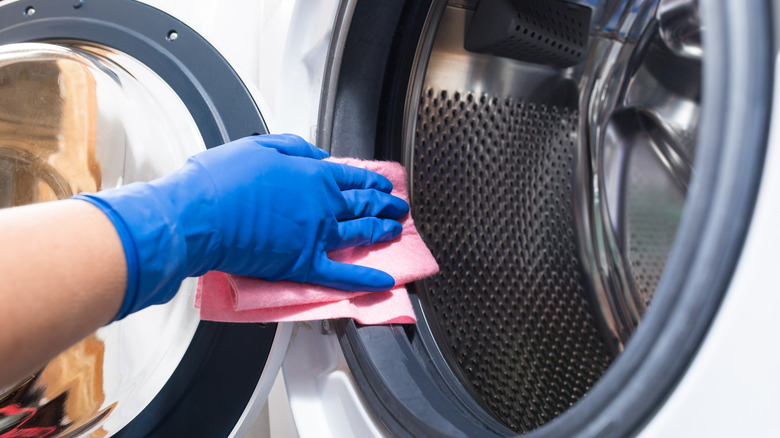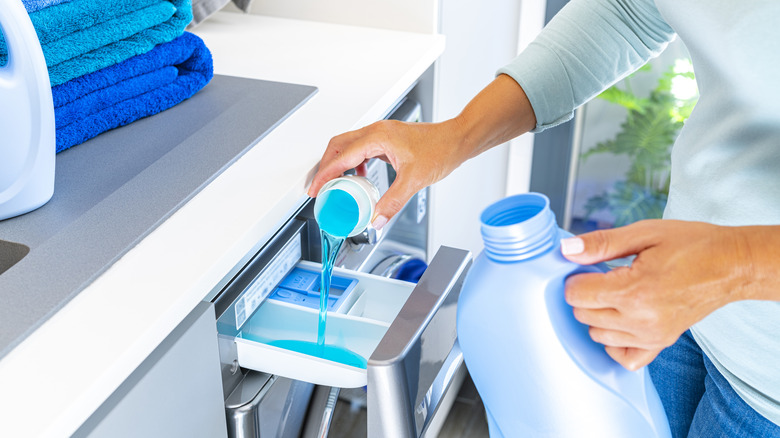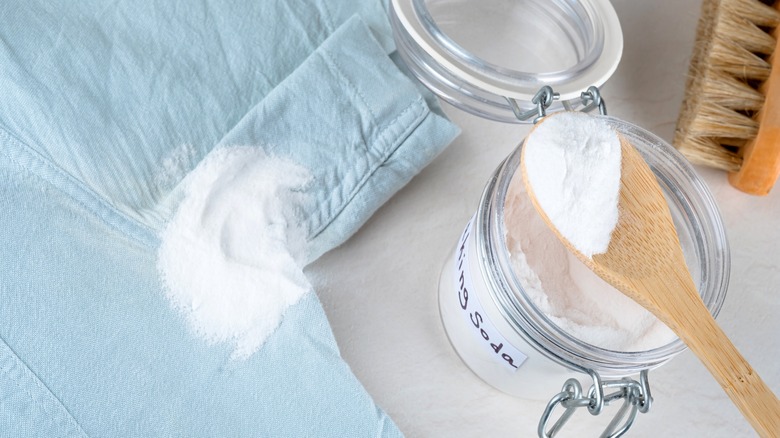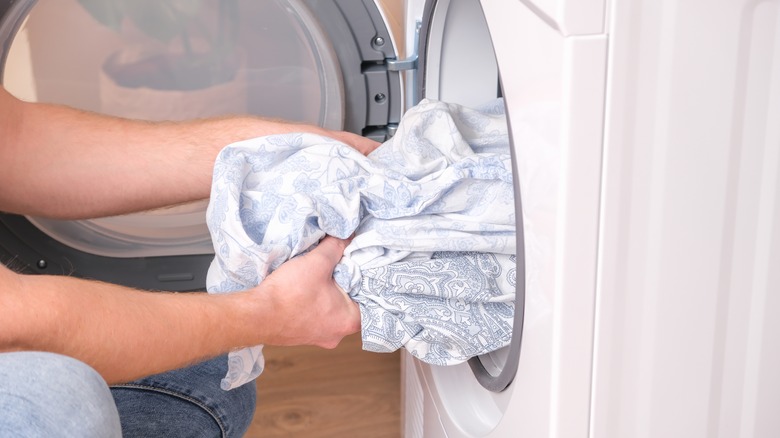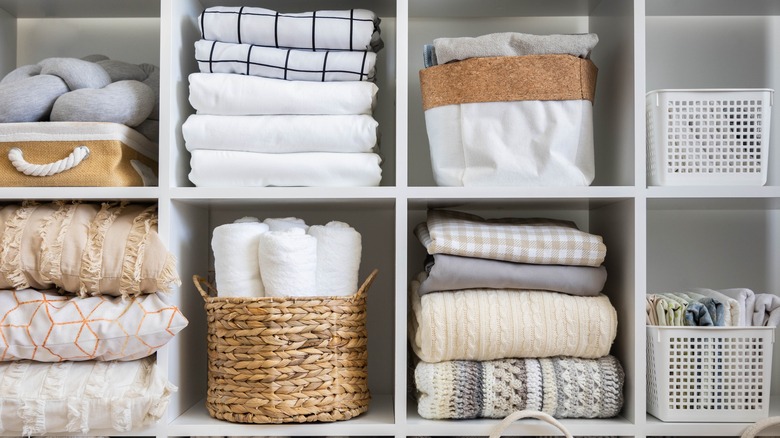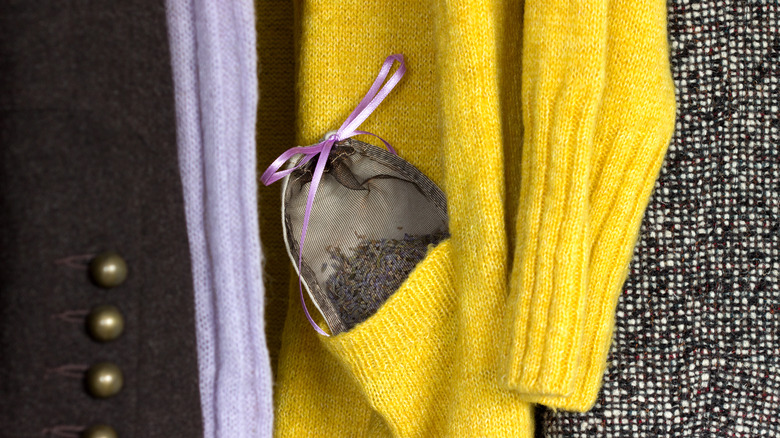8 Ways To Make Your Laundry Stay Fresher Longer
Most American families wash about 300 loads a year — that's a lot of laundry! With so many hours spent in the laundry room, you want your hard work to pay off. A job well done means your clothes and linens come out clean and fresh. It's even better if that freshness sticks around for a while, and that's a goal you can accomplish with a few easy steps. From keeping your washing machine clean to choosing the right cleaning products, and even adding accessories to your closet, it's possible to keep your laundry fresher for longer.
Keep in mind that freshness extends beyond a crisp and clean scent. Your laundry may smell nice, but if your garments are worn and dingy, they won't feel or look fresh. That's why it's important to take care of your clothes as well, and that starts with the laundering process. Some of the habits that help keep your laundry delightfully clean can also help your garments and textiles last longer as well. So, we've rounded up some tips for you to use come laundry day to help your garments both smell and look fantastic in the long run.
Keep your washing machine clean
Ever opened your washer and gotten a whiff of mildew? It's not pleasant, and that musty washing machine smell can transfer onto laundry loads, leaving "clean" items with a not-so-clean odor. Dirt, detergent residue, bacteria, mold, mildew, and hard water buildup can all contribute to a smelly washing machine. Besides not leaving an odor on laundry, a clean machine works more effectively, which also means cleaner loads.
Your washing machine should be cleaned around once a month. The easiest way to tackle this chore is with a specialized cleaning product. These are affordable and come in powder, liquid, or tablet forms. They'll have the directions right on the packaging, which usually just involves running the product in a hot water wash cycle. Other cleaning options are available using items you might already have at home, such as cleaning your machine with household bleach or white vinegar (separately, of course). Just keep in mind that vinegar may damage some machine components with frequent use, so it's often safer, in the long run, to reach for dedicated washer cleaners. If you have a front-loading machine, don't forget to clean the rubber gasket as well, which can hide mold or mildew that contributes to odors.
Use the right laundry detergent and products
Scent boosters, fragranced laundry detergent, and dryer sheets all contribute to a fresh smell that can linger after you pull your clothes from the wash. But beyond just choosing an appealing scent, you also want to choose the right detergent for your laundering habits and needs. For example, if you wash in cold water wash, you'll want a detergent formulated for cold water. If your gym clothes are extra funky and your regular detergent isn't cutting it, you might need a specific one that's better formulated to remove sweat and body oils. For removing smells and stains, consider a product with enzymes, which can help break down grime to thoroughly clean garments.
If you have sensitive skin, you might want to stay clear of highly scented products, which can be irritating. In this case, you can use products formulated for sensitive skin, which usually have minimal or naturally derived scents. Another option is to use unscented products and then add your own natural scents, for example, by using a dab of essential oil on felted wool dryer balls. You can also hang laundry outside to dry in the breeze to get a crisp smell, sans perfumes.
Sort your laundry properly (and into smaller loads)
It's not just a myth — it really does make a difference when you sort your laundry properly. One of the most obvious reasons is to prevent color bleeding, which can make clothes look older or ruin them altogether. Sorting by material type can also prevent excessive wear from different materials mixing. For example, if your denim is always washed with your delicates, the rough texture can make your fragile clothes look more worn and dingy.
When washing very dirty items, another way to approach sorting is to split by level of soiling. Washing items with other equally dirty laundry can prevent the transfer of dirt, grime, or odors from more soiled to less soiled garments. In other words, don't put your kid's muddy soccer gear with your barely worn blouse, or you might just end up with lingering mud or sweat on both!
While sorting laundry, also consider load size and don't overfill your machine. Too much laundry means the washing machine can't agitate the clothes enough, which can mean an uneven and less effective scrub. Generally, most washing machine drums should only be filled up to ¾ full to ensure the clothes can tumble freely.
Follow the care label instructions
It's so easy to ignore a care label and just toss an item in the wash — almost all of us have probably done it at some point. But this isn't doing your laundry any favors. Those tags are there for a reason! They explain the best way to wash your items, both to get them clean and preserve their quality. If the label says to hand wash and air-dry a delicate item, it's worth taking the extra time to do so, since that's how to get it clean without causing damage. Cold water washing tends to be less rough on a fabric's color and integrity, so it can also help your items look nice for longer.
If a label says you can wash a garment in steaming hot water, that's something you can take advantage of too. While a cold water wash can get many items clean enough, sometimes a higher temperature cycle is in order. When hot water-washable garments need a deep clean, warmer water can offer a more effective scrub, resulting in cleaner and fresher-smelling laundry. Generally, warm water provides an excellent clean for moderately soiled items, and you'll want to use hot water for heavily soiled items. Of course, only go as hot as the care label specifies to prevent damage.
Take advantage of pantry staples like vinegar and baking soda
Staples in both the pantry and the cleaning cupboard, vinegar and baking soda can also help keep clothes fresh. Vinegar can be run with a load of laundry to get rid of odors, take care of stains, and soften fabric. Use it as needed in the rinse cycle to freshen up clothes. Keep in mind that overuse might degrade some fabrics, so there's no need to run it in every load. Baking soda has laundry room benefits that are similar to vinegar, neutralizing odors, eliminating stains, and softening fabrics. For odors and lightning, you can try a baking soda soak by mixing a cup or two of baking soda with a bucket of water and letting garments sit in the solution for a few hours. Another way to use baking soda is to put a cup of it directly into the drum and wash your laundry as usual.
Both vinegar and baking soda can be used after your laundry is washed as well. Vinegar is a natural deodorizer, and you can use a spray bottle of it (diluted to your liking) to freshen up clothes between washes. And, just like in the refrigerator, an open box of baking soda can also be placed in the closet to absorb odors and keep clothes fresh.
Don't let damp or warm laundry sit
Damp conditions let bacteria grow and thrive — including ones that leave laundry smelling musty and gross. Prevent any loads from sitting damp for too long, every step of the way. This starts with taking care of dirty, damp items right away. Whether it's sweaty gym clothes, used towels, or rain-soaked jackets, it won't get any fresher from sitting in the laundry hamper while wet. Either wash these items right away or let them dry out before tossing them in the hamper.
Once washed, hang dry or transfer clean, wet loads to the dryer right away. Drying items immediately prevents that damp smell that can come from sitting in a wet washing machine. As a bonus, it also preserves the look of clothes and helps prevent wrinkles. In terms of a fresh and crisp look, don't let warm laundry sit in the dryer either. That's another recipe for wrinkles. Take out dry laundry as soon as possible and hang or fold clothes. Even if you can't put it away right away, taking it out of the dryer, shaking each item out, and laying it flat will go a long way in keeping clothes looking crisp.
Store your laundry properly
Before putting laundry away, make sure items are clean and fully dry, and store them in a cool, well-ventilated space. Whether it's clothing, towels, or linens, they can all benefit from breathing room. If you have to stuff items into a shelf or cupboard, it's probably packed in too tightly. A little wiggle room allows for some airflow to keep things fresher. Preventing dampness is important for both short-term and long-term storage — moisture is the enemy of fresh laundry! For this reason, towels and linens should not be stored in the bathroom.
When it comes to seasonal or long-term storage, avoid storing items in cardboard for long lengths of time since it is permeable to both water and pests. Plastic bins are a popular option since they're waterproof and pest-resistant. However, you may need to air out items every once in a while to discourage musty smells and place moisture absorbers in bins to prevent dampness. In temperature- and moisture-controlled storage areas, breathable fabric or canvas containers are a great alternative that allows for airflow. These containers aren't waterproof and aren't as pest-resistant, so they're better suited to well-monitored, frequently accessed storage areas.
Keep nice-smelling items in your closets and drawers
Even if you stick to all the tips above, if your storage area doesn't smell fresh, neither will your clothes and linens. Make sure closets, drawers, and storage bins are clean before putting your laundry away. Prevent smells from getting inside in the first place by only placing clean items in storage. Cedar closets and cedar clothes hangers have a naturally occurring smell that is very pleasant, so you can opt for these materials if you enjoy the woodsy fragrance.
There are other ways to add a fresh scent to your closet. First, start with removing any unpleasant scents. You can buy air-purifying bags, which contain odor-absorbing activated charcoal, or use items you already have around the house. A small bowl of baking soda or coffee grounds placed in the closet can help absorb smells.
There are a few options for adding a nice scent to your storage area. You can buy or make your own dried herb sachets, using lavender, mind, rosemary, or other fragrant herbs. Essential oils are another naturally derived option; just dot a few drops on a cotton pad and place it in the back of your closet. Dryer sheets have an infamously fresh smell, and if you want to impart that on your linens and clothes, throw some into your storage area.

